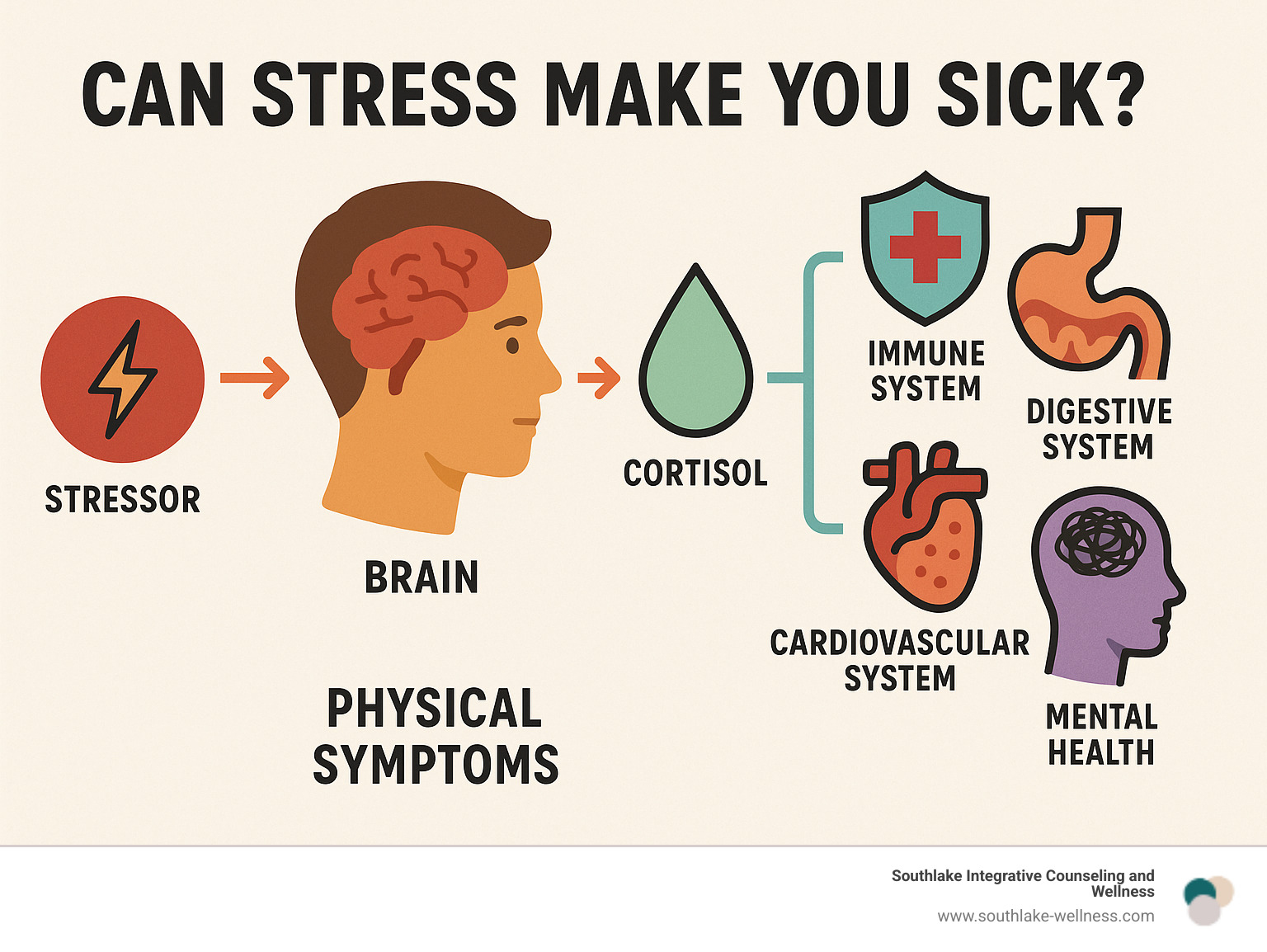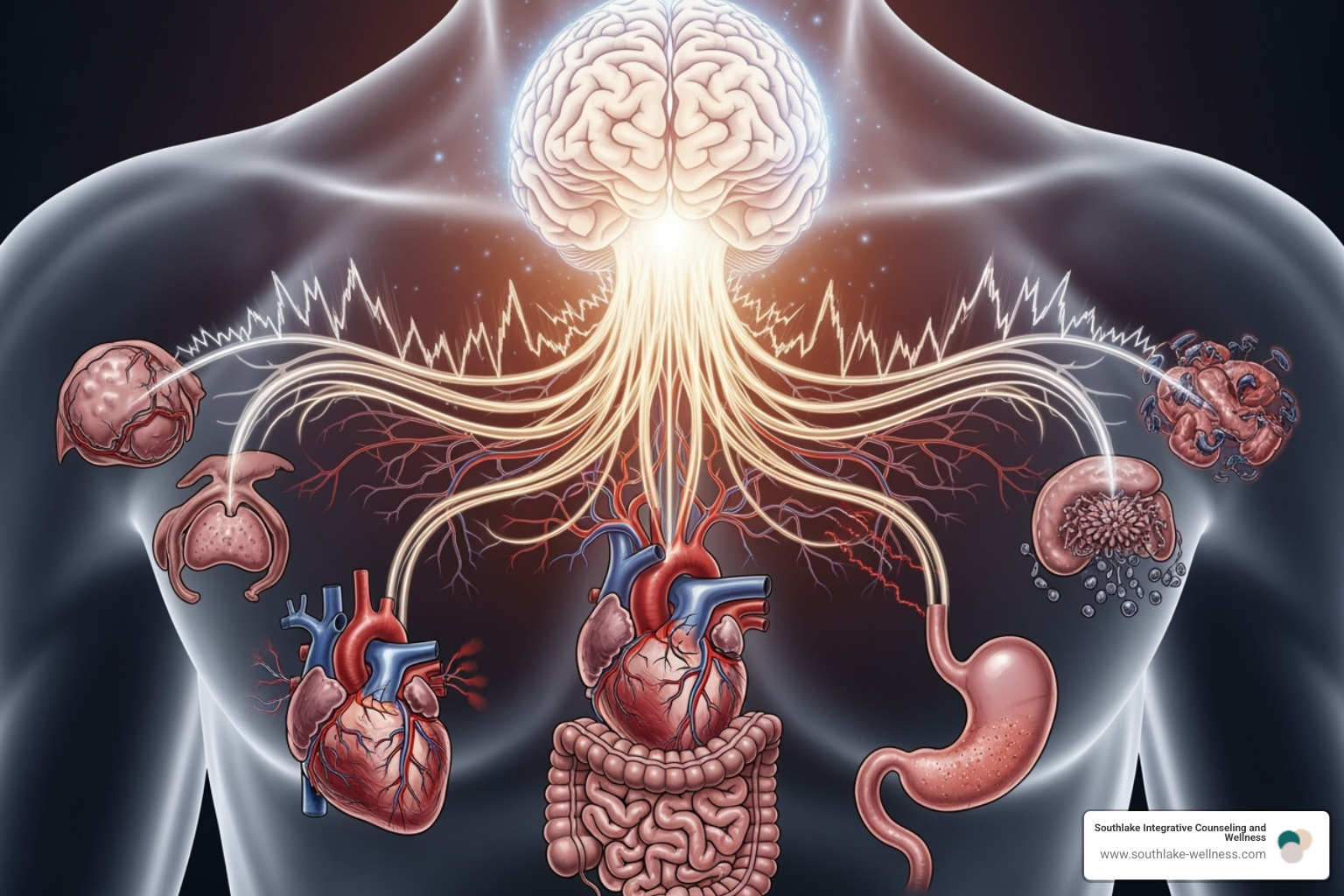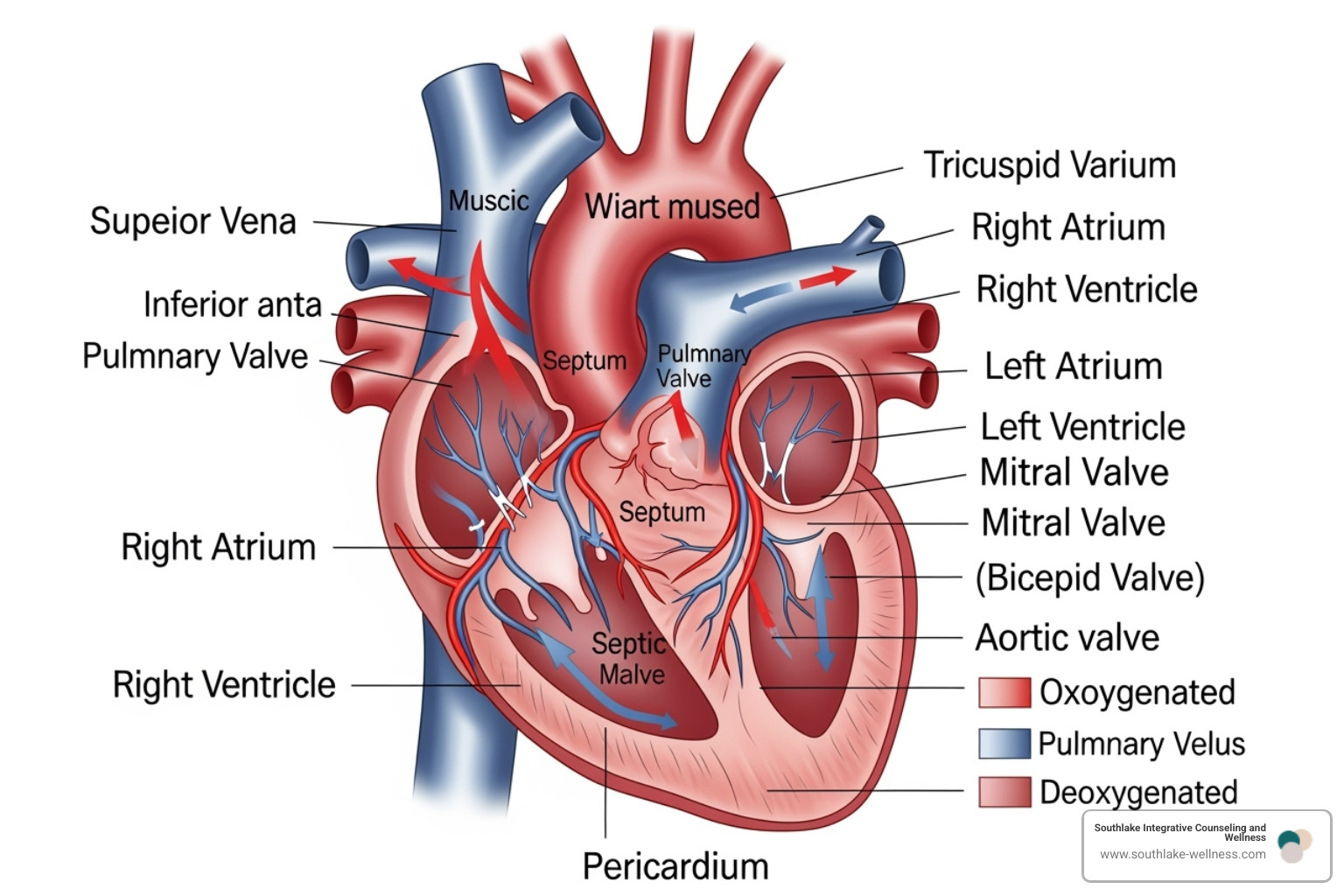
Your Body's Alarm System: Understanding the Stress Response
Can stress make you sick? The answer is a resounding yes. Research suggests 60 to 80 percent of doctor visits are stress-related, and chronic stress can lead to serious health problems like heart disease, digestive issues, and weakened immunity.
Quick Answer: How Stress Makes You Sick
- Immune System: Stress hormones suppress white blood cells, making you more prone to infections and slower healing.
- Digestive System: Creates stomach pain, nausea, heartburn, and can trigger IBS.
- Heart Health: Raises blood pressure and cholesterol, increasing heart disease risk.
- Mental Health: Disrupts brain chemistry, leading to anxiety, depression, and concentration problems.
- Pain & Headaches: Causes muscle tension, migraines, and increases pain sensitivity.
- Sleep & Energy: Disrupts sleep patterns and leaves you feeling exhausted.
When you face a stressful situation, your body launches into "fight-or-flight" mode. Your heart pounds and stress hormones like cortisol flood your system. This response helped our ancestors survive, but today's constant stressors—work deadlines, financial worries—can keep this alarm system stuck on.
The problem isn't stress itself; short-term stress can boost performance. It's when stress becomes chronic that your body pays the price. As a Licensed Professional Counselor specializing in trauma and anxiety, I've seen how the question "can stress make you sick" is a daily reality for many. Understanding this mind-body connection is the first step toward healing.

Good Stress vs. Bad Stress
Not all stress is created equal. Some stress, called "eustress," can be good for us. Think of the thrill of a new project or the energy boost before a tight deadline. This positive stress sharpens focus and drives us to achieve great things.
However, the line between helpful eustress and harmful "distress" is thin. Our bodies are equipped to handle short-term bursts of stress, like slamming on the brakes to avoid an accident. The sympathetic nervous system kicks in, releasing adrenaline and cortisol to prepare us for action.
But when stressors are constant—relentless work pressure, ongoing financial strain—this alarm system never switches off. Our bodies remain in a state of high alert, which suppresses our immune system, causes wear and tear on our internal systems, and ultimately, makes us sick. The difference lies in whether we get a chance to recover or if we're perpetually stuck in a state of alarm.
The Tipping Point: When Acute Stress Becomes Chronic
Imagine a car suddenly cuts you off. Your heart races, and adrenaline surges. Within minutes of avoiding danger, you're back to normal. This is acute stress—your body's brilliant, short-lived response to an immediate threat. It's like a smoke alarm: it gets your attention, then it stops. Once the threat passes, your parasympathetic nervous system brings everything back to calm.
But what happens when that alarm never stops ringing?
Chronic stress is different. It's a slow-burning fire that never goes out, stemming from a daily grind that doesn't let up: a demanding boss, mounting bills, or ongoing health issues. Unlike acute stress, chronic stress lingers without a clear end.
Major life events like a divorce, the loss of a loved one, or a serious illness can also push your stress response into overdrive for months or years. Your body, designed for short sprints, finds itself running a marathon it never trained for.
When stress becomes chronic, your body's alarm system gets stuck in the "on" position, creating "wear and tear" on nearly every system. The numbers tell a sobering story: studies indicate that about 50% of job absenteeism is caused by stress. When we ask "can stress make you sick," we're talking about real, measurable damage to our health.
Here's how acute and chronic stress compare:
FeatureAcute StressChronic StressDurationShort-term, immediate reactionProlonged, ongoing, persistentPhysiological ResponseTemporary increase in heart rate, blood pressure, muscle tensionSustained elevation of stress hormones, systemic inflammationImmune SystemTemporary boost, improved initial responseSuppression, weakened defenses, increased susceptibility to illnessEnergy LevelsBurst of energy, increased focusPersistent fatigue, exhaustion, burnoutMental StateAlertness, focused problem-solvingAnxiety, irritability, depression, memory issuesHealth ImpactGenerally benign, aids performanceIncreased risk of chronic diseases (heart disease, diabetes, GI issues)RecoveryQuick return to baselineRequires significant effort and time to recover
The impact of stress on body function: A review
How Your Body Keeps Score
Your body keeps track of every stressful day and sleepless night. Scientists call this internal accounting system allostatic load. Think of it as your body's stress credit card—and chronic stress means you're constantly maxing it out.
When stress is constant, your body's main stress control center—the HPA axis (hypothalamic-pituitary-adrenal axis)—starts to malfunction. Instead of a smooth response, the system gets stuck on repeat. This means your body stays in a constant alert state, and your stress hormones, particularly cortisol, remain at high levels. While helpful in small doses, a constant flow of cortisol becomes toxic.
This relentless activation leads to resource depletion. Your body is essentially running on empty, trying to maintain an emergency response 24/7. The health consequences ripple through every system, setting the stage for everything from frequent colds to serious chronic diseases. Your body keeps score, and chronic stress writes a story of wear and tear that shows up in very real, physical ways.
How Can Stress Make You Sick? A System-by-System Breakdown
When stress takes hold, it doesn't just stay in your head. It travels throughout your body, and the connection is undeniable: research shows that 60 to 80 percent of doctor visits may be stress-related. That's your body waving a white flag.
Stress symptoms are master disguises. You might experience physical symptoms like headaches, muscle tension, or deep fatigue. Your emotional world can spin with anxiety and a lack of motivation. Your behavior might change, causing you to snap at loved ones or alter your eating habits. Stress is an equal opportunity troublemaker, affecting you from head to toe.

Statistics on stress-related doctor visits
The Immune System: Your Weakened Defenses
Think of your immune system as your body's security team. Short-term stress gives it a temporary boost, but chronic stress exhausts it. The main culprit is cortisol. When constantly flooding your system, it suppresses your immune defenses, reducing the number of lymphocytes—the white blood cells that fight off viruses. This means you catch more colds, cuts take longer to heal, and the flu hits you harder. A study in the Proceedings of the National Academy of Sciences found that people under chronic stress were significantly more likely to develop a cold when exposed to a virus. Research on chronic stress and inflammation
The Digestive System: A Gut Feeling Gone Wrong
Ever feel your stomach churn when you're nervous? That's your gut-brain axis—the nerve network connecting your brain and gut. Stress tells your digestive system to take a back seat, redirecting blood flow to your muscles. The result is miserable: stomach pain, nausea, heartburn, diarrhea, and constipation. For people with Irritable Bowel Syndrome (IBS), stress is often a major trigger for debilitating symptoms. That "gut feeling" is literally your digestive system telling you that stress is taking over. The link between stress and IBS
The Cardiovascular System: A Heavy Heart
Your heart carries the weight of your worries. When stress hits, your heart beats faster to prepare for action. This is perfect for a short-term threat but devastating when it never stops.

Chronic stress leads to persistent high blood pressure and liftd cholesterol levels, creating a perfect storm for heart disease. The INTERHEART study found that heart attack patients reported significantly higher levels of stress in the year before their cardiac event. Research on stress and heart disease risk. In extreme cases, severe emotional trauma can cause Takotsubo cardiomyopathy, or "broken heart syndrome," where the heart muscle temporarily weakens. It's a stark reminder that heartbreak is physiologically real.
The Nervous System: Headaches, Pain, and Mental Fog
Your nervous system is your body's electrical grid, and stress can cause short circuits. Constant muscle tension leads to tension headaches and can trigger or worsen migraines. The "let-down" headache effect. Stress also makes you more sensitive to aches and pains. Perhaps most frustrating is the mental fog that settles in. You struggle to concentrate and simple decisions feel overwhelming. This isn't just in your head; chronic cortisol exposure interferes with brain areas responsible for memory and focus. At Southlake Integrative Counseling and Wellness, we see this mind-body connection daily. Mind-Body Physical Therapy and Wellness
Mental and Emotional Health: The Toll on Your Mind
The link between stress and mental health is even stronger than its link to physical illness. Anxiety and stress feed each other, triggering generalized anxiety or panic attacks. Anxiety Therapy Southlake. Depression often follows as stress disrupts brain chemicals like serotonin. The sadness and loss of interest are a physiological response to being overloaded. Research linking stress and depression. You might also become more irritable and restless. Many people turn to unhealthy coping mechanisms like alcohol or overeating, which creates more health problems. Our holistic approach addresses the whole person, not just the symptoms. Holistic Approach to Depression
Other Surprising Ways Stress Can Make You Sick
- Psychogenic fever: Stress can literally raise your body temperature.
- Weight gain: Cortisol increases appetite, cravings for comfort foods, and belly fat storage. Research on stress and obesity
- Skin problems: Acne, eczema, psoriasis, and mysterious rashes can flare up.
- Allergies and asthma: Stress can worsen symptoms by triggering histamine release.
- Sleep problems: Stress makes it hard to fall and stay asleep, creating a vicious cycle of exhaustion.
- Increased accidents: Poor concentration and slowed reaction time make you more prone to injuries.
Reclaiming Your Health: Holistic Strategies for Stress Management
Here's the empowering truth: while can stress make you sick is a real concern, you have more control than you think. The goal isn't a stress-free life, but building resilience to manage stress before it manages you.
Think of it like strengthening your physical defenses. You can build your stress defenses through intentional practices. The difference between crumbling under pressure and thriving often comes down to the tools in your stress management toolkit.

At Southlake Integrative Counseling and Wellness, we've seen how a holistic approach transforms lives by addressing stress from multiple angles. Holistic Stress Management Techniques. The key is moving from passive coping (like scrolling social media) to active strategies that build resilience.
Mindful Movement and Relaxation
Movement is nature's best stress medicine. Physical activity provides a healthy outlet for pent-up stress energy.
- Regular exercise, even a 30-minute walk, releases feel-good endorphins and burns off stress hormones like cortisol. Studies on exercise for mood
- Yoga and Tai Chi combine movement, breathing, and mindfulness, teaching you to find calm in the middle of chaos.
- Deep breathing exercises can shift your nervous system from stressed to calm in minutes by signaling to your brain that you're safe.
- Progressive muscle relaxation, tensing and then releasing muscle groups, helps you recognize and release tension before it builds up.
We often weave these practices into our clients' wellness plans, understanding the crucial mind-body connection. Mind-Body Connection Massage Therapy
Nourishing Your Body and Mind
What you put into your body directly affects how you handle stress. Think of nutrition and self-care as armor.
- A balanced diet of whole foods provides nutrients for mood stability and energy. Avoid sugary snacks and excess coffee, which cause energy crashes.
- Adequate sleep (7-9 hours) is essential for stress recovery. Create a relaxing bedtime routine away from screens.
- Limiting alcohol and caffeine can make a huge difference. Alcohol disrupts sleep and can increase anxiety, while too much caffeine keeps your nervous system overstimulated.
- Journaling offers a safe space to process worries and gain perspective.
- Hobbies and creative activities like gardening, painting, or music provide a much-needed mental break from stress.
Mind-body therapies like massage can also be incredibly healing. Mind-Body Harmony Massage Therapy
The Power of Connection
Your relationships may be your most powerful stress management tool. Strong social bonds act as a buffer against life's challenges.
- Spending time with supportive family and friends releases oxytocin, a hormone that counteracts stress and promotes calm.
- Talking with trusted friends can provide emotional release and new perspectives. Just saying worries out loud can reduce their power.
- Joining groups or communities combats the isolation that often accompanies chronic stress. Connecting with like-minded people creates a sense of belonging.
Cultivate a few meaningful relationships where you feel supported. Reducing isolation is crucial, as loneliness can trigger the same stress response as physical pain.
When to Seek Professional Help for Stress
Sometimes, self-care isn't enough. Recognizing when you need professional help is a sign of wisdom, not weakness. Can stress make you sick to the point where intervention is necessary? Absolutely. There are clear signs it's time to reach out.
- Persistent symptoms: If chronic headaches, digestive issues, or frequent illnesses interfere with your daily life, it's time to get help.
- Feeling overwhelmed: If you consistently feel like you're drowning or that life's demands are too much, professional support can provide better tools.
- Unhealthy coping mechanisms: If you're turning to alcohol, overeating, or other substances to escape, a professional can help you develop healthier alternatives.
- Suicidal thoughts: If you're having thoughts of self-harm, please reach out for help immediately. You don't have to handle this alone.
- Self-help isn't enough: If you've tried everything and are still struggling, professional guidance can help you find what will work for you.
Up to 90% of primary care visits are for stress-related complaints, showing how common it is to need support. At Southlake Integrative Counseling and Wellness, we provide the personalized support you deserve. Personalized Mental Health Care
What to Expect from Therapy
Therapy is a partnership with a trained professional to better understand and manage your stress. The process often begins by identifying stressors, both obvious and hidden. From there, you'll work together to develop coping skills custom to your situation.
Evidence-based strategies like Cognitive Behavioral Therapy (CBT) are highly effective. CBT helps you identify and change negative thought patterns that worsen stress. Mindfulness-based therapies teach you to stay present and observe your thoughts without judgment, reducing the intensity of your stress response.
Your therapist will help you create a personalized wellness plan. This roadmap is designed around your lifestyle and challenges, integrating everything from daily mindfulness practices to strategies for setting boundaries. The goal is not just to cope with stress, but to improve your overall quality of life, build resilience, and feel more in control.
Seeking help is a sign of strength. We're committed to providing compassionate, comprehensive support on your journey to better health. Mental Health Matters Guide
Take Control of Your Well-being
We've seen how can stress make you sick by uncovering the deep interconnection between our minds and bodies. But here's the hopeful truth: the mind-body connection is real, which means we have real power to heal.
When stress wreaks havoc on our health, it's easy to feel helpless. But the same pathways that allow stress to make us sick can also be pathways to healing. I've seen in my work that stress is manageable with the right tools and support.
You have the power to change your response to life's challenges. This is about creating the conditions for your body's natural healing abilities to thrive. Whether through deep breathing, exercise, or therapy, you are not powerless.
At Southlake Integrative Counseling and Wellness, we've seen countless people transform their relationship with stress. Our approach recognizes that healing happens on multiple levels—emotional, physical, and spiritual. We don't just treat symptoms; we help you build lasting resilience.
The evidence is clear: chronic stress can make you sick. But it's also true that when we manage stress effectively, our bodies can repair and restore themselves. Your immune system can strengthen, your digestion can improve, and your mind can find peace.
Taking control doesn't mean doing it alone. Reaching out for support is one of the most powerful stress-busters. Asking for help—whether from a friend, a group, or a professional therapist—is a sign of strength.
Don't let stress continue to dictate your health. The path to wellness starts with a single step. Begin your journey to wellness with individual therapy in Southlake, TX.